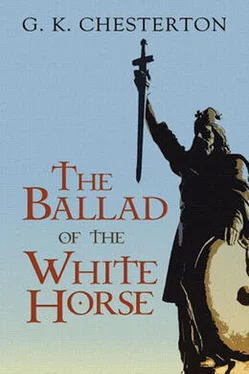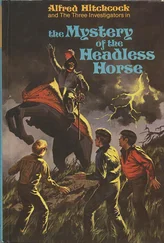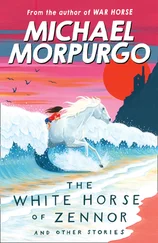And they all abode like statues—
One sitting on the stone,
One half–way through the thorn hedge tall,
One with a leg across a wall,
And one looked backwards, very small,
Far up the road, alone.
Grey twilight and a yellow star
Hung over thorn and hill;
Two spears and a cloven war–shield lay
Loose on the road as cast away,
The horn died faint in the forest grey,
And the fleeing men stood still.
"Brothers at arms," said Alfred,
"On this side lies the foe;
Are slavery and starvation flowers,
That you should pluck them so?
"For whether is it better
To be prodded with Danish poles,
Having hewn a chamber in a ditch,
And hounded like a howling witch,
Or smoked to death in holes?
"Or that before the red cock crow
All we, a thousand strong,
Go down the dark road to God's house,
Singing a Wessex song?
"To sweat a slave to a race of slaves,
To drink up infamy?
No, brothers, by your leave, I think
Death is a better ale to drink,
And by all the stars of Christ that sink,
The Danes shall drink with me.
"To grow old cowed in a conquered land,
With the sun itself discrowned,
To see trees crouch and cattle slink—
Death is a better ale to drink,
And by high Death on the fell brink
That flagon shall go round.
"Though dead are all the paladins
Whom glory had in ken,
Though all your thunder–sworded thanes
With proud hearts died among the Danes,
While a man remains, great war remains:
Now is a war of men.
"The men that tear the furrows,
The men that fell the trees,
When all their lords be lost and dead
The bondsmen of the earth shall tread
The tyrants of the seas.
"The wheel of the roaring stillness
Of all labours under the sun,
Speed the wild work as well at least
As the whole world's work is done.
"Let Hildred hack the shield–wall
Clean as he hacks the hedge;
Let Gurth the fowler stand as cool
As he stands on the chasm's edge;
"Let Gorlias ride the sea–kings
As Gorlias rides the sea,
Then let all hell and Denmark drive,
Yelling to all its fiends alive,
And not a rag care we."
When Alfred's word was ended
Stood firm that feeble line,
Each in his place with club or spear,
And fury deeper than deep fear,
And smiles as sour as brine.
And the King held up the horn and said,
"See ye my father's horn,
That Egbert blew in his empery,
Once, when he rode out commonly,
Twice when he rode for venery,
And thrice on the battle–morn.
"But heavier fates have fallen
The horn of the Wessex kings,
And I blew once, the riding sign,
To call you to the fighting line
And glory and all good things.
"And now two blasts, the hunting sign,
Because we turn to bay;
But I will not blow the three blasts,
Till we be lost or they.
"And now I blow the hunting sign,
Charge some by rule and rod;
But when I blow the battle sign,
Charge all and go to God."
Wild stared the Danes at the double ways
Where they loitered, all at large,
As that dark line for the last time
Doubled the knee to charge—
And caught their weapons clumsily,
And marvelled how and why—
In such degree, by rule and rod,
The people of the peace of God
Went roaring down to die.
And when the last arrow
Was fitted and was flown,
When the broken shield hung on the breast,
And the hopeless lance was laid in rest,
And the hopeless horn blown,
The King looked up, and what he saw
Was a great light like death,
For Our Lady stood on the standards rent,
As lonely and as innocent
As when between white walls she went
And the lilies of Nazareth.
One instant in a still light
He saw Our Lady then,
Her dress was soft as western sky,
And she was a queen most womanly—
But she was a queen of men.
Over the iron forest
He saw Our Lady stand,
Her eyes were sad withouten art,
And seven swords were in her heart—
But one was in her hand.
Then the last charge went blindly,
And all too lost for fear:
The Danes closed round, a roaring ring,
And twenty clubs rose o'er the King,
Four Danes hewed at him, halloing,
And Ogier of the Stone and Sling
Drove at him with a spear.
But the Danes were wild with laughter,
And the great spear swung wide,
The point stuck to a straggling tree,
And either host cried suddenly,
As Alfred leapt aside.
Short time had shaggy Ogier
To pull his lance in line—
He knew King Alfred's axe on high,
He heard it rushing through the sky,
He cowered beneath it with a cry—
It split him to the spine:
And Alfred sprang over him dead,
And blew the battle sign.
Then bursting all and blasting
Came Christendom like death,
Kicked of such catapults of will,
The staves shiver, the barrels spill,
The waggons waver and crash and kill
The waggoners beneath.
Barriers go backwards, banners rend,
Great shields groan like a gong—
Horses like horns of nightmare
Neigh horribly and long.
Horses ramp high and rock and boil
And break their golden reins,
And slide on carnage clamorously,
Down where the bitter blood doth lie,
Where Ogier went on foot to die,
In the old way of the Danes.
"The high tide!" King Alfred cried.
"The high tide and the turn!
As a tide turns on the tall grey seas,
See how they waver in the trees,
How stray their spears, how knock their knees,
How wild their watchfires burn!
"The Mother of God goes over them,
Walking on wind and flame,
And the storm–cloud drifts from city and dale,
And the White Horse stamps in the White Horse Vale,
And we all shall yet drink Christian ale
In the village of our name.
"The Mother of God goes over them,
On dreadful cherubs borne;
And the psalm is roaring above the rune,
And the Cross goes over the sun and moon,
Endeth the battle of Ethandune
With the blowing of a horn."
For back indeed disorderly
The Danes went clamouring,
Too worn to take anew the tale,
Or dazed with insolence and ale,
Or stunned of heaven, or stricken pale
Before the face of the King.
For dire was Alfred in his hour
The pale scribe witnesseth,
More mighty in defeat was he
Than all men else in victory,
And behind, his men came murderously,
Dry–throated, drinking death.
And Edgar of the Golden Ship
He slew with his own hand,
Took Ludwig from his lady's bower,
And smote down Harmar in his hour,
And vain and lonely stood the tower—
The tower in Guelderland.
And Torr out of his tiny boat,
Whose eyes beheld the Nile,
Wulf with his war–cry on his lips,
And Harco born in the eclipse,
Who blocked the Seine with battleships
Round Paris on the Isle.
Читать дальше












